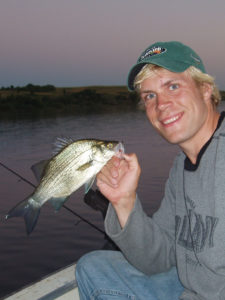
By Nick Simonson
These days I drink bad coffee. Not bad, per se, but only half caffeinated, which according to the old me is bad, as in my younger years I spent much of the morning riding the lightning of a black oily brew so thick I could cut with a knife. That dosage was often followed by a battery of Diet Cokes in the afternoon to keep things rolling. As I wait for the limited amount of the stimulant to enter my system while sipping on the third glass of the morning writing this column, hoping it will trigger some sort of inspiration in my brain and the letters and words will flow down through my shoulders, wrists and fingertips and onto the electronic paper before me, I think of how the flow of life – and time in the outdoors – changes from day to day and year to year and note that, like the shot of energy from my morning drink, I’ve chosen to slow things down where I can, while still enjoying a rush here and there.
Because even now, I move quickly outdoors. It’s not the “turned up to 11” of my youth, but I’m still clicking around 9.5 when things are averaged out. That missing 1.5 can be attributed to more solitary activities such as sneaking out for a solo trip over still waters, drinking in the silence of being on a lake all alone to start the day with the silent swimming geese and the first waking birds on shore calling out to the rising sun. I’m starting to realize the magic in the experience of finding fish, as opposed to finding them, catching them and posting them to the internet as I was so obsessed with as a younger angler, even before Facebook and Instagram became society’s preferred methods of proving one’s existence and worth on the water. Enjoying the journey to the hookset often allows for a bit more understanding and appreciation of the whole experience.
Things still go fast, though, keeping my average operating speed elevated. When my boys and I are on an active school of crappies or bluegills and bobbers begin disappearing, my job as hook baiter, line untangler, and photographer of each and every fish turns an hour-long feeding frenzy into what feels like a blur of just a few seconds as dirt and worm chunks fly and fish flip and flop their way into the boat until the only evidence of the outing are the slight stick marks on my hand from sharp dorsal fins and a pile of pictures in the memory card of smiles and spinning fish held up on the end of a monofilament stretch.
Perhaps where things have slowed down the most in my outdoor experiences is the time spent deer hunting. Whether waiting for the first visible light of day to illuminate the green 20-yard dot on my sight pin, or wishing that the mid-afternoon sun would begin making its downward trek, drawing the first doe-and-fawn pair out in the evening field to feed, time seems to slow down as a still hunter, perched on a stand or sitting along a trail in some hillside brush. The crackle of leaves, the swish of grass or the sound of hoof steps on the nearby path through cover, however, turns a waiting period into some sort of time warp, where adrenaline slaps the biological alarm clock to the floor and my brain into high gear, and time bends and curls around the potential for a deer to come close enough to justify going to full draw. Even if that doesn’t happen, I touch those areas up around 11 in terms of excitement, energy and endorphins and go from zero to sixty in about seven nanoseconds when I see a deer of any sort.
While things don’t run at the full speed of my youth, I can still keep up with my lab when I know he’s on a running rooster and I can pound a shoreline with tubes and jigs in those haunts I have found smallmouth bass in seasons before while zipping between them with the trolling motor turned all the way up. The slowing down of things has come by choice and understanding of the natural world and enjoyment of it, as opposed to any physical limitation involved in entering middle age, unlike the coffee I drink, which most certainly is designed to keep my fingers from trembling and my heart from skipping a beat as my tolerance for the stimulant wanes. Thankfully, I’m still able to experience those symptoms from the pull of a hard-charging unseen fish after the hookset and the first sight of antlers each fall…in our outdoors.
